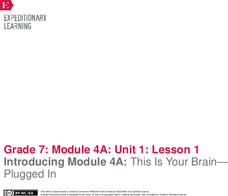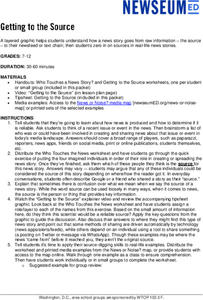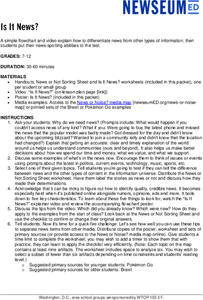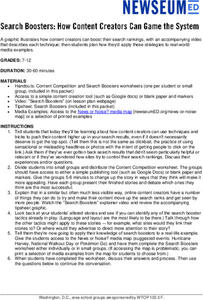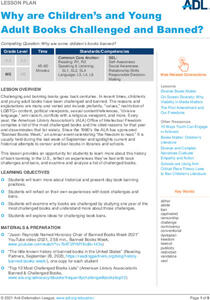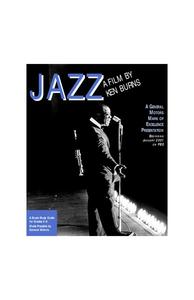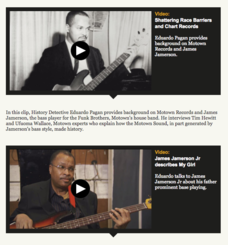PBS
Civil War: Blacks on the Battlefield
Imagine a war being fought to free slaves, with slaves on the front line. Scholars use primary documents, videos, and research in the second installment of a three-part series to guide their analysis of the first African-Americans on the...
Little Kids Rock
The Influence of Latin Music in Postwar New York City
Music has often been called the international language that transcends cultures and regions. Scholars analyze the impact of Latin American music on New York City culture in the years following World War II. They research music, video,...
EngageNY
Introducing Module 4A: This Is Your Brain—Plugged In
What does brain science reveal about teens and decision making? Scholars watch a short video and participate in a gallery walk to pique their interest and curiosity about the topic. Next, they begin reading an informational article about...
EngageNY
The Storyteller’s Toolbox and Excerpt 4 First Read
It's story time! Scholars take a look through the eyes of a storyteller as the teacher reads aloud The People Could Fly. They also listen as the story is played on video. Learners then answer questions about the reader's facial...
EngageNY
Mid-Unit Assessment, Part 1 and Excerpt 4 Third Read
I hear you! Scholars work on the mid-unit assessment by listening to a story told orally rather than reading it themselves. After watching a video clip of Thelma Thomas performing Harriet Tubman, they answer questions about what they...
EngageNY
Tracing and Evaluating Arguments: “The Future of Water” and The Big Thirst
Can scholars predict the future? They try as they first watch the video The Future of Water to capture details and trace the argument. Next, individuals complete the Tracing an Argument
note catcher to guide their thoughts. To finish,...
News Literacy Project
Get Smart About COVID-19
Pandemic or infodemic? Scholars complete an online quiz to determine if they can sort fact from fiction related to COVID-19 information. Pupils view a variety of news articles, social media posts, and video clips to practice identifying...
PBS
Who Knows Best
Finding an expert in a given field when conducting research can be a challenge. This guide provides step-by-step directions as well as links to resources that help young sleuths find the authorities and experts they need. As a bonus, two...
PBS
Predicting/Making a Hypothesis
As an introduction to the hypothesis and testing method of investigation, young history detectives engage in a special investigation of a family artifact. After watching a short video that demonstrates the method, they develop a...
Newseum
Getting to the Source
Reliable news stories are based on facts from reliable sources. Young journalists learn how to evaluate the reliability of news sources by watching a short explainer video. Teams apply their new source-digging skills to a current news...
Newseum
Recognizing Bias: Analyzing Context and Execution
Young journalists learn how to identify bias in the news media. First, they watch a video in which a Newseum expert identifies bias in a story about the 1919 Chicago race riots. They then use what they have learned to analyze a recent...
News Literacy Project
Fact-Check It!
Here's a lesson designed to help learners develop their digital verification skills. First, expert groups study specific digital verification skills, and in a jigsaw activity, share what they have learned with classmates. The jigsaw...
Newseum
Is It News?
Is it news or not? That is the question young journalists must consider in a lesson about newsworthiness. Class members watch a short video that details five key characteristics of quality, credible news. Individuals then use these tips...
Newseum
Quick Skim or Deep Dive? Picking the Right Search Strategy
To search online to find answers to some questions requires only a quick skim, while others demand deep research. Scholars engage in a lesson plan that teaches them the difference and how to craft questions that produce the best online...
Newseum
Search Boosters: How Content Creators Can Game the System
Scholars examine the techniques content creators use to boost their search rankings. After watching a short "Search Boosters" video, groups select a story from the "News or Noise? Media Map" and analyze the devices used in the story. The...
Anti-Defamation League
Why are Children’s and Young Adult Books Challenged and Banned?
September's "Banned Books Week" brings attention to the number of books that are challenged, censored, or banned each year. After watching a video about banned book week, reading articles about the history of book banning, and examining...
K20 LEARN
Mob Mentality and "The Outsiders": Integrating Fiction and Nonfiction
S. E. Hinton's The Outsiders allows middle schoolers to reflect on mob mentality. After reading an article and watching a video about herd mentality, class members find examples in the novel of when characters go along with the crowd and...
Mr. Roughton
CSI: Florence
Who done it? Class groups adopt the role of crime scene investigators and examine exhibits (primary source documents) to determine who attempted to assassinate the members of the Medici dynasty.
General Motors Corporation
Jazz
Over the history of the world, music has been at the heart of some of the greatest social and political movements. Scholars discover their musical roots as they dive into the sounds and emotions of renowned jazz players. They see how...
PBS
Using Primary Sources: Wide Open Town
A picture speaks a thousand words, no matter how old! Scholars use political cartoons from the era of Prohibition and the Temperance Movement to analyze what, a primary document (in this case, a bootlegger's notebook) is telling them...
PBS
The Sixties: Hitsville USA
James Jamerson. You probably heard him but may not have heard of him. But fans of Motown Records will certainly recognize his contributions to the sound that desegregated popular music during the 1960s. Challenge young history detectives...
Channel Islands Film
Arlington Springs Man: Lesson Plan 4
West of the West's documentary Arlington Springs Man introduces viewers to the remarkable finds on Santa Rosa Island. Archaeologist have discovered on this small island that is part of the Channel island chain, human and pygmy mammoth...
PBS
How to Teach Your Students about Fake News
What media literacy skills do people need to evaluate a news source? Scholars listen to and discuss an NPR story about how fake headlines often dupe young people and adults alike. Next, they study news stories, using a fact-checking...
US Department of Education
A Close Reading of Lincoln’s Gettysburg Address
Abraham Lincoln's Gettysburg Address provides the text for a series of close reading exercises that model for instructors how carefully crafted guiding questions can help readers think critically about what they read, thus developing...
Other popular searches
- Educational Videos
- Bill Nye Video Questions
- Butterfly Life Cycle Video
- Aztecs Videos
- Video Games
- Digital Video Camera
- Video Production
- Acid Rain Videos
- Conflict Management Videos
- Dental Health Videos
- Home Economics Videos
- Video Cellular Respiration




